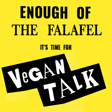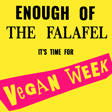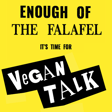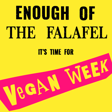
191- Does the dairy industry trigger families who have lost children?
This week a VIVA! advert highlighting practices in the dairy industry was banned on the grounds that it could be triggering for families who have lost their children...which raises the question as to whether the dairy industry itself should be banned for similar reasons! In this week's episode, Mark, Kate & Ant discuss this and another ten or so stories from the vegan & animal rights space from the last fortnight.
****************
Enough of the Falafel is a community of people who love keeping on top of the latest news in the world of veganism & animal rights. With the Vegan Week podcast, we aim to keep listeners (& ourselves) informed & up-to-date with the latest developments that affect vegans & non-human animals; giving insight, whilst staying balanced; remaining true to our vegan ethics, whilst constantly seeking to grow & develop.
Each week we look through news stories from the past 7 days in the world of veganism & animal rights.
If you spot any news stories that might catch our fancy, or have an idea for a discussion topic, get in touch via enoughofthefalafel@gmail.com.
*******************
This week's stories:
https://www.conservation.org/press-releases/2025/06/06/new-amazon-protected-area-safeguards-iconic-species-and-indigenous-stewardship-in-peru
https://www.mirror.co.uk/tv/tv-news/bbc-viewers-brand-countryfile-disgusting-35512798
https://www.pcrm.org/news/news-releases/landmark-shift-nih-announces-no-more-exclusive-funding-animal-experiments
https://www.civilsociety.co.uk/news/vegan-charity-sees-insensitive-cinema-ad-banned-after-25-complaints.html
https://www.youtube.com/watch?v=Bo8yFT53kpk&t=22s
https://www.glasgowtimes.co.uk/news/25295684.glasgow-hydro-announces-food-will-plant-based/?ref=rss
https://www.earth.com/news/processed-meat-can-cause-health-issues-even-in-tiny-amounts/
https://www.theanimalreader.com/2025/07/07/activists-block-veal-slaughterhouses-over-vandrie-group-calf-cruelty/
https://www.theguardian.com/world/2025/jul/14/labour-not-implemented-animal-welfare-pledges-say-campaigners
https://www.vegansociety.com/news/news/missed-opportunity-nhs-10-year-plan
https://www.sbs.com.au/news/article/cultured-meat-delicious-alternative-or-frankenstein-food/j7civ5efc
https://www.facebook.com/reel/1354748415621317/
https://www.thenational.scot/news/25302440.sspca-reduce-small-wildlife-rescues-due-compliance-issue/
https://plantbasednews.org/lifestyle/food/switzerland-food-animals-labeled/
****************
Thanks everyone for listening; give us a rating and drop us a message to say "hi"; it'll make our day!
Mark, Kate & Ant



